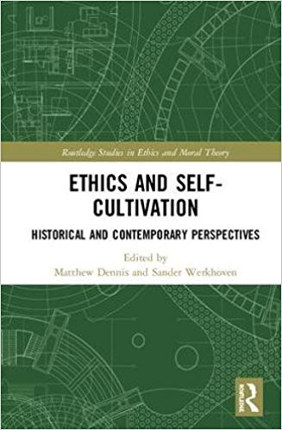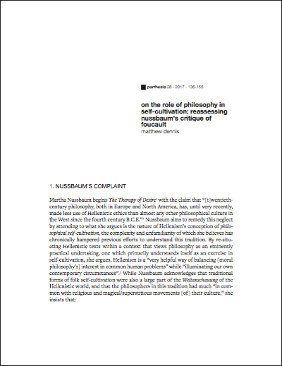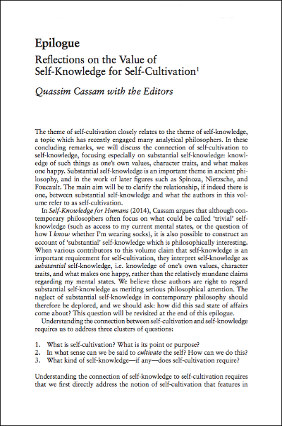Books and Edited Volumes
.jpg)
Does a flourishing life involve pursuing passionate attachments? Can we choose what these passionate attachments will be? What criteria distinguish positive passionate attachments from negative ones? This book develops a philosophical theory of how we can cultivate our passionate attachments, drawing on the resources of contemporary analytic philosophy and ancient ethics. I argue that our passionate attachments are some of the most powerful (and distinctively human) motivations in our practical lives. I also show why we have reason to view passionate attachments as susceptible to growth, change, and self-directed manipulation. Understanding how the passionate attachments can be self-cultivated offers new ways to improve our lives, both in theory and in practice. This book aims to show how ethical insights regarding the passionate attachments inform the practical task of cultivating the self.

Is self-directed character change possible? How important is it from an ethical viewpoint? The aim of Ethics and Self-Cultivation is to establish and explore a new "cultivation of the self" strand within contemporary moral philosophy. The multiple authors of this volume offer a new approach to the eudaimonic tradition, showing how the self-cultivation is essential for important aspects of the flourishing life. The first section of essays looks at how ancient thinkers of self-cultivation influenced modern thinkers on this topic. The second section offers contemporary perspectives on ethical self-cultivation by drawing on work in moral psychology, epistemology of self-knowledge, philosophy of mind, and meta-ethics. Preface by Prof. Michael Slote. Epilogue by Prof. Quassim Cassam.
Peer-Reviewed Articles

** Winner of Australian Society of Continental Philosophy Postgraduate Essay Prize **
Nussbaum's critique of Foucault's work on Hellenistic self-cultivation is severe. Not only is Foucault blind to the fundamentally important philosophical dimension of Hellenistic self-cultivation, his previous work disqualifies him from understanding the central role of reason, rationality, and logical argumentation in this tradition. Although Nussbaum is correct to say that Foucault's notion of the "care of the self" includes a greater range of practices and techniques than her own narrower account of philosophical self-cultivation, in this article I will suggest that the force of her criticisms miss the mark. Fully understanding Foucault's reading of the Hellenistic tradition shows that he thinks of techniques of self-cultivation as a necessary complement to philosophy, although on their own these practices cannot be considered as constituting philosophy itself.
Book Chapters

Philosophers invariably assume a conception of self-knowledge when they discuss self-cultivation, but the precise relationship between between self-knowledge and self-cultivation can be understood in different ways and often remains undertheorised. This epilogue examines how we can understand the relationship between self-knowledge and self-cultivation, making a case for what will be called a low-road explanation of the value of self-knowledge. To do this, the authors draw connections and contrasts with the chapters contained in the volume, and explore the idea that substantial self-knowledge as opposed to trivial self-knowledge deserves to be given more attention by contemporary philosophers